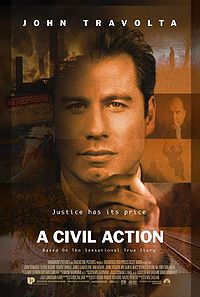Favorite Law Movies: A Civil Action
 There are many great law-related movies, but the one that has special resonance for me is A Civil Action (1997). In fact, back when I taught Civil Procedure, I required students to watch the film, and we had some really terrific class discussions about it. The plot centers on a lawsuit brought by a group of residents of Woburn, Massachusetts, against several industrial polluters. At the heart of the film is the confrontation between an up-and-coming plaintiffs’ lawyer played by John Travolta and a grizzled, big-firm defense lawyer played by Robert Duvall. The Duvall character seems an avatar of the amoral corporate lawyer, whereas the moral status of the Travolta character seems more uncertain and may evolve over the course of the movie.
There are many great law-related movies, but the one that has special resonance for me is A Civil Action (1997). In fact, back when I taught Civil Procedure, I required students to watch the film, and we had some really terrific class discussions about it. The plot centers on a lawsuit brought by a group of residents of Woburn, Massachusetts, against several industrial polluters. At the heart of the film is the confrontation between an up-and-coming plaintiffs’ lawyer played by John Travolta and a grizzled, big-firm defense lawyer played by Robert Duvall. The Duvall character seems an avatar of the amoral corporate lawyer, whereas the moral status of the Travolta character seems more uncertain and may evolve over the course of the movie.
Both actors deliver deeply engaging performances, as do several other top-flight character actors in supporting roles. (James Gandolfini is especially good as a blue-collar employee of one of the defendants who must decide whether or not to cooperate with the plaintiffs’ lawyer; he doesn’t have many lines, but he exudes this barely subdued rage, looking as if he would like nothing more than to punch somebody out, if only he could decide at whom he should really be angry.)
But, in addition to great acting and a compelling story, there are lots of other reasons this movie really works for me.

